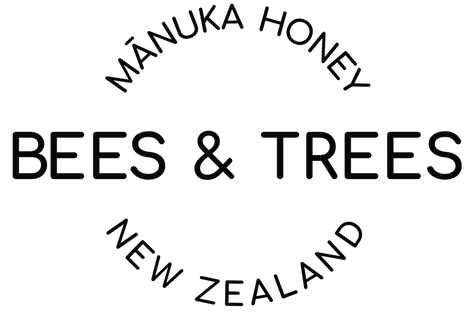Honey is a precious food that has been used for many centuries. More than 5,500 years ago, it was used to preserve the dead, heal wounds, treat baldness, coughs, sore throats and as an offering to the gods. [1] While some of the use cases are irrelevant in the modern age, one thing remains: honey’s medicinal properties are timeless. It is still being used to alleviate coughs, colds, sore throat, wounds, etc. In this article, we will investigate honey’s properties and potential benefits in boosting your body’s immune system functions.
What Is Honey, and Why Is It Good for Us?

Honey is a thick, sweet, golden liquid that is produced by bees. It is made up of a wide range of compounds, including carbohydrates, proteins, enzymes, vitamins, and minerals. [2] The specific composition of honey is not constant, and it varies depending on the type of flower the bees forage, the environment, and the season of the year.
One of the main components of honey is carbohydrates, which give honey its sweet taste and provide energy for bees and humans alike. The primary carbohydrate in honey is fructose, although it contains other carbohydrates like glucose, sucrose, and maltose, among others. Honey also contains small amounts of proteins and enzymes. These proteins and enzymes play different roles in the body, such as helping to digest food, supporting the immune system, and regulating the body's metabolism.
In addition to carbohydrates, proteins, and enzymes, honey also contains a range of vitamins, such as B6, thiamin, niacin, riboflavin, pantothenic acid, and C, including minerals like calcium, copper, iron, magnesium, manganese, phosphorus, potassium, and zinc. These vitamins and minerals support overall health and provide a range of wellness benefits.
Honey also contains antioxidants, which help protect the body against damage from free radicals. Free radicals are unstable molecules that can damage cells and are thought to be a major contributing factor to the development of chronic diseases. By neutralizing free radicals, antioxidants help to protect the body against their harmful effects.
Honey’s compounds have made it a classic go-to remedy for thousands of years. In Ayurvedic medicine, it was used to help with digestion, coughs, oral health, insomnia, and skin disorders. In early Egyptian civilizations, honey was used together with wine and milk for healing wounds, as a topical ointment, and to embalm the dead. In ancient Greece, it was combined with substances like unfermented grape juice, vinegar, and water as a remedy for fevers, wounds, sore throats, coughs, and baldness. [2]
Now let’s take an in-depth look at Manuka honey and why it is special.
What is Manuka Honey?

Manuka honey is honey produced by bees that forage on the flowers of the Manuka tree (Leptospermum scoparium), which is native to New Zealand. The word “Manuka” was given to the tree by the indigenous Maori people who found it to have healing and wellness properties when they came to the islands of Aotearoa. [3]
Manuka honey contains a variety of macro and micronutrients, which are linked to its numerous health benefits. It contains amino acids, flavonoids, polyphenols, amino acids, proteins, enzymes, minerals, vitamins, sugars, and high concentrations of the organic compound methylglyoxal (MG). Manuka honey is highly regarded for its potent antimicrobial properties, which correlate to the presence of methylglyoxal. [4]
What Makes Manuka Honey So Special?

In 1980, Dr. Peter Molan, a biochemist from Waikato University in New Zealand, was studying the peroxide properties of different types of honey and their effectiveness in inhibiting bacterial growth when he discovered a very unique antibacterial property. He observed that the Manuka honey sample had a non-peroxide bacterial activity, which distinguished it from other types of honey. It was more potent, lasted longer, and inhibited a wider range of bacteria types than other types of honey. This led to the launch of worldwide interest in Manuka honey and its special properties. [5]
In 2008, Professor Thomas Henle of the Technical University of Dresden pinpointed the exact compound that was producing the antibacterial effect in Manuka honey. The compound in question was methylglyoxal, which is formed through the conversion of the organic compound dihydroxyacetone (DHA) to MG during the honey’s maturation process. [6] He concluded that the presence of methylglyoxal correlated with Manuka honey’s non-peroxide activity. This discovery led to the development of a testing standard for New Zealand Manuka honey producers, which relies on the concentration of methylglyoxal to determine the potency and purity of Manuka honey.
Apart from methylglyoxal, Manuka honey contains a greater variety of flavonoids and phenolic compounds than other types of honey. [7] Flavonoids have anti-inflammatory, anti-viral, and antibacterial properties that add to Manuka honey’s benefits. For instance, phenolic compounds like syringic acid and pinocembrin are normally linked to antimicrobial activity. Due to Manuka honey’s potent properties, it is widely researched as a natural supplement to antibiotics due to growing antibiotic resistance.
Immunity: What Makes Us Sick?

Immunity is the body's ability to protect itself against foreign or harmful substances, such as bacteria and viruses. It's a complex system that involves several different organs and tissues, as well as white blood cells and antibodies. When the body is exposed to a foreign substance, it may trigger an immune response, which is commonly known as inflammation.
Inflammation is a natural response to infection or injury, and it's generally a good thing because it helps the body to heal and fight off foreign substances. However, chronic inflammation can lead to a number of serious health problems, including heart disease, diabetes, and arthritis. In some cases, inflammation can also lead to autoimmune disorders, in which the immune system mistakenly attacks healthy cells in the body. So, while inflammation is a normal and necessary part of the immune response, chronic inflammation can contribute to the development of some diseases. [8]
Manuka Honey’s Immune Boosting Properties

Manuka honey has been lauded for its immune-boosting abilities in the body. In particular, researchers have found that it increases the release of cytokines in the body. [9] Cytokines are critical proteins that help control the activity of other immune system components, blood cells, and immune system cells. They are very helpful in the growth of other cells involved in the immune system response to infection. [10]
According to research, Manuka honey may also be beneficial in the production of Mucosal Associated Invariant T cells (MAIT cells) in the body, which are a subset of human T cells. These cells are important in regulating immune system activities like antimicrobial defense mechanisms and the integrity of the mucosal barrier. [11]
Given Manuka honey’s strong medicinal properties, it is often used as a preventative measure and to treat symptoms. Let’s have a look at some of Manuka honey’s properties in relation to different aspects of the immune system.
- Respiratory Health
Honey, in general, is widely used for respiratory issues and is a common go-to home remedy for colds and flu. According to research, Manuka honey has strong antiviral properties, which might be effective against virus-caused infections like influenza. In a 2014 study, researchers showed that Manuka honey has potential medicinal value in inhibiting the activity of the influenza virus. [12] It was also confirmed in another 2016 study where researchers said, “ MGO has potent inhibitory activity against influenza B viruses, including NA inhibitor-resistant strains.” [13]
Antibiotic resistance is on the rise, which makes it imperative for natural and alternative ways to manage bacterial infections. In a 2015 study investigating the susceptibility of clinical isolates obtained from cystic fibrosis patients to Manuka honey, the researchers found that combining Manuka honey with antibiotics helped lower the minimal inhibitory concentration of antibiotics, thus making them more effective. The researchers reported that Manuka honey might be used synergistically as a management measure of P. aeruginosa and B. cepacia, which are a huge threat to people with chronic respiratory conditions. [14] When it was investigated against active chronic rhinosinusitis (which is caused by Staphylococcus aureus) in patients who had prior surgery, researchers found that it helped improve the outcomes. [15]
Manuka honey’s effectiveness against P. aeruginosa was also confirmed in a 2019 study, which stated that “These results highlight the potential of Manuka honey as a future antimicrobial for the treatment of pulmonary P. aeruginosa isolates, clearing potential infection reservoirs within the upper airway.” [16]
- Oral Health
Honey has long been used as a traditional remedy for preventing cavities and gingivitis. [17] It has antibacterial properties, which help fight oral bacteria and reduce acidity in the mouth. Manuka honey, in particular, was reported to help prevent plaque in a 2010 study. [18]
In a 2014 study investigating the antibacterial potential of Manuka honey against three oral bacteria in vitro, researchers reported that Manuka honey “showed a significantly higher antibacterial effect compared to the other honeys tested. All Manuka honey preparations were more effective in inhibiting the growth of P. gingivalis and A. actinomycetemcomitans, rather than S. mutans.” In simple terms, when used regularly for oral care, Manuka honey may be an effective first line of defense against viral and bacterial infections by defeating them at the point of entry oral care. [19]
- Digestive Health
Manuka honey has strong antimicrobial properties, which help support digestive health. In a 2010 study investigating the antibacterial effect of Manuka honey on gastrointestinal pathogens, researchers concluded that Manuka honey was effective against antibiotic-resistant microorganisms like Salmonella typhimurium DT104 and ESBL-producing organisms. [20]
Manuka honey has also demonstrated anti-ulcer properties that may be important in protecting the gastrointestinal system. In a 2016 study, researchers investigated the gastroprotective effects of Manuka honey against ethanol-induced gastric ulcers in rats and reported that “Manuka honey significantly decreased the ulcer index, completely protected the mucosa from lesions, and preserved gastric mucosal glycoprotein. It significantly increased gastric mucosal levels of NO, GSH, GPx, and SOD. Manuka honey also decreased gastric mucosal MDA and plasma TNF-α, IL-1β, and IL-6 concentrations.” [21]
Diseases of the gastrointestinal tract are often associated with chronic inflammation discussed above. Understanding dietary or other causes of chronic inflammation is key to good digestive health long term. Manuka honey’s properties may play a role in preventing or treating some of these conditions enabling your immune system to stand down from continued overactivity in this part of your body.
- Skin Health and Wound Care
Manuka honey applications go beyond internal uses. It can also be used externally as a topical ointment to heal wounds and improve skin health. Apart from inhibiting bacterial growth, methylglyoxal has immunomodulatory effects (immunomodulatory effects support the immune system by modifying the immune system’s response in a good way) that aid in wound healing and tissue regeneration. [22]
In a 2017 study investigating the effectiveness of Manuka honey in the treatment of atopic dermatitis (AD), researchers concluded that Manuka honey might be potentially beneficial in treating atopic dermatitis lesions. [23] In another study investigating the effectiveness of Manuka honey-impregnated dressings in the treatment of neuropathic diabetic foot ulcers, researchers reported that Manuka honey-impregnated dressings might be an effective treatment option as they rapidly disinfect the ulcers and reduce healing time. [24]
Manuka honey also possesses benefits for the scalp. It was reportedly used to successfully resolve folliculitis decalvans (a rare scarring alopecia where the patient tends to have tender pustules and papules on their scalp) in a 20-year-old man with three years of unmanageable pustules. [25]
Is Daily Consumption of Manuka Honey Helpful?

There is no scientific evidence that directly supports the thesis that daily consumption of Manuka honey will improve your health and fortify your immunity. There is research evidence that the Methylglyoxal in Manuka honey is bioavailable in your body’s bloodstream after digestion [26]. Our ancestors going back thousands of years understood the healing and wellness properties of honey and passed this information down from generation to generation. Hippocrates, the father of modern medicine, credited with laying the foundation for what today is termed evidence-based medicine, also said, “Let food be thy medicine and medicine be thy food.”
At Bees & Trees Honey, we believe in the daily consumption of Manuka honey, and it is something our families can attest to. Our beliefs are reinforced by the hundreds of emails and customer reviews we have received in the form of testimonials about the benefits our customers have experienced. We encourage you to explore some of the research linked to in the appendix and make your own decision on what is right for your daily wellness routine.
Some of our favorite ways to eat Manuka honey is to savor it right off the spoon twice a day — one teaspoon in the morning and another in the evening. You can also mix it with drinks like tea, milk, or yogurt. When mixing honey with hot drinks, take care not to add it to very hot liquids (above 180 degrees or so), as prolonged exposure to high temperatures can reduce the MG content.
If you are looking for a healthy way to consume Manuka honey, here’s one of our favorite immune-boosting health drink recipes.
How to Make a Manuka Honey Immune-Boosting Tea

This special Manuka honey immune-boosting tea consists of only healthy ingredients, which are known to be helpful in boosting immunity.
Ingredients:
- 2 cups water
- 5 cm piece of fresh sliced ginger
- 1-2 tbsp Bees & Trees Manuka honey
- 1-2 tbsp raw apple cider vinegar
- 1 tbsp lemon juice
Instructions:
- Add the ginger to two cups of water and boil for about 10-15 minutes.
- Turn off the heat, strain the ginger and let the ginger water cool slightly (say 5-10 min).
- Add 1-2 tablespoons of your Bees & Trees Manuka honey into a cup.
- Followed by the apple cider vinegar and lemon juice.
- Once the ginger water is cool enough, add it to the cup and stir until the honey has dissolved.
- Enjoy your healthy drink!
Conclusion

While honey is believed to be a natural remedy and immune booster, it is important to note that the scientific evidence in this area is limited. More research is needed to confirm the specific immune-boosting effects of honey. It is also important to remember that honey is not a substitute for a healthy diet and lifestyle. Additionally, if you are feeling unwell or have any specific health concerns, it is always best to consult with a healthcare provider to receive tailored advice and treatment.
Grab your jar of authentic, fresh, hive-to-jar Manuka honey and begin enjoying its benefits today.
References:
- Honey and Health: A Review of Recent Clinical Research - PMC https://www.ncbi.nlm.nih.gov/pmc/articles/PMC5424551/
- Traditional and Modern Uses of Natural Honey in Human Diseases: A Review PMC https://www.ncbi.nlm.nih.gov/pmc/articles/PMC3758027/#:~:text=Honey%20is%20composed%20primarily%20of,on%20which%20the%20bee%20feeds.
- Eaton, V. C. (2016). In Manuka: The biography of an extraordinary honey. essay, Exisle Publishing.
- Manuka honey, a unique mono-floral honey. A comprehensive review of its bioactives, metabolism, action mechanisms, and therapeutic merits - ScienceDirect https://www.sciencedirect.com/science/article/abs/pii/S2212429221001632
- Non-Peroxide Antibacterial Activity in Some new Zealand Honeys https://www.tandfonline.com/doi/abs/10.1080/00218839.1988.11100783
- Identification and quantification of methylglyoxal in Manuka honey - Magritek % https://magritek.com/2021/01/29/identification-and-quantification-of-methylglyoxal-in-manuka-honey/
- Phenolic acids and flavonoids profiles of commercial honey from different floral sources and geographic sources https://www.tandfonline.com/doi/full/10.1080/10942912.2019.1579835
- Chronic inflammation in the etiology of disease across the life span - PMC https://www.ncbi.nlm.nih.gov/pmc/articles/PMC7147972/
- Manuka Honey Modulates the Release Profile of a dHL-60 Neutrophil Model under Anti-Inflammatory Stimulation - PMC https://www.ncbi.nlm.nih.gov/pmc/articles/PMC7239342/
- Honey stimulates inflammatory cytokine production from monocytes https://pubmed.ncbi.nlm.nih.gov/12824009/
- Mānuka honey-derived methylglyoxal enhances microbial sensing by mucosal-associated invariant T cells - Food & Function (RSC Publishing) https://pubs.rsc.org/en/content/articlelanding/2020/FO/D0FO01153C#!divAbstract
- Anti-influenza viral effects of honey in vitro: potent high activity of manuka honey https://www.ncbi.nlm.nih.gov/pubmed/24880005
- In vitro evaluation of the antiviral activity of methylglyoxal against influenza B virus infection https://pubmed.ncbi.nlm.nih.gov/27558282/
- A demonstration of the susceptibility of clinical isolates obtained from cystic fibrosis patients to manuka honey https://pubmed.ncbi.nlm.nih.gov/25680398/
- Manuka honey sinus irrigation for the treatment of chronic rhinosinusitis: a randomized controlled trial https://pubmed.ncbi.nlm.nih.gov/27935259/
- Anti-pseudomonad Activity of Manuka Honey and Antibiotics in a Specialized ex vivo Model Simulating Cystic Fibrosis Lung Infection https://pubmed.ncbi.nlm.nih.gov/31105667/
- The effects of manuka honey on plaque and gingivitis: a pilot study https://pubmed.ncbi.nlm.nih.gov/15125017/
- Effect of Manuka honey, chlorhexidine gluconate and xylitol on the clinical levels of dental plaque - PMC https://www.ncbi.nlm.nih.gov/pmc/articles/PMC3220139/
- Antibacterial potential of Manuka honey against three oral bacteria in vitro | Request PDF https://www.researchgate.net/publication/266151929_Antibacterial_potential_of_Manuka_honey_against_three_oral_bacteria_in_vitro
- The controlled in vitro susceptibility of gastrointestinal pathogens to the antibacterial effect of manuka honey https://pubmed.ncbi.nlm.nih.gov/21165664/
- Antioxidant, Anti-inflammatory, and Antiulcer Potential of Manuka Honey against Gastric Ulcer in Rats https://pubmed.ncbi.nlm.nih.gov/26770649/
- Health Benefits of Manuka Honey as an Essential Constituent for Tissue Regeneration https://pubmed.ncbi.nlm.nih.gov/28901255/
- Honey is potentially effective in the treatment of atopic dermatitis: Clinical and mechanistic studies https://pubmed.ncbi.nlm.nih.gov/28474502/
- Manuka honey‐impregnated dressings in the treatment of neuropathic diabetic foot ulcers - Kamaratos - 2014 - International Wound Journal - Wiley Online Library https://onlinelibrary.wiley.com/doi/full/10.1111/j.1742-481X.2012.01082.x
- Resolution of folliculitis decalvans with medical honey https://escholarship.org/uc/item/07n6v0hs
- In vivo absorption and metabolism of leptosperin and methyl syringate, abundantly present in manuka honey https://pubmed.ncbi.nlm.nih.gov/28444960/







